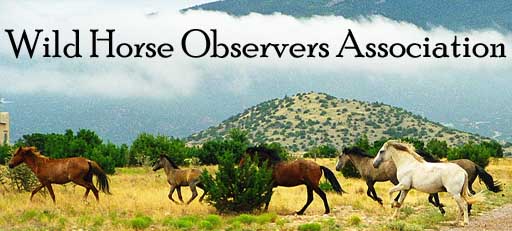
|
|
|
FOR IMMEDIATE RELEASE
Federal Lands' Wild Horse Population Status in NMMay 10, 2003I’m sure that most folks don’t know that we have (or had) ten Wild Horse Preserves here in New Mexico, as mandated by Congress. Let me list and summarize them: Wild Horse and Burro Territories on USDA National Forests (FSM 2200 Range Management)
Only 3 of 9 USDA National Forests above currently have any horses; these totaling a desired population of 148. The only preserve on BLM land is kept at or below 70. MANY THOUSANDS of cattle are on these same “preserves” vs. 218 wild horses. Fate of Adopted Wild Horses is not all proud and beautiful. Experts say that this population level is not enough to keep the individual herds genetically viable. Also, although it is not required by the 1971 Free Roaming Wild Horse and Burro Act, many of these horses (such as those at recent El Rito round up) contain a significant amount of Spanish blood markers. Most round-ups are brutal. Many adoptions are unsuccessful. Many end up at the slaughter houses where they are dismembered while conscious, because, as most are not aware, the 1958 Humane Slaughter Act is NOT enforced for horses or cattle. Videos are available. South American BEEF imports ARE hurting the small ranchers. The wild horses are NOT impacting the cattle industry. There are those of us that think there can be a middle ground which would help ranchers, our economy, the environment, and the wild horses. We, as well as other Livestock publications, feel that importation of millions of tons of beef from South America significantly depress prices, thus requiring more cattle per NM rancher, to make a small buck. (Also, while significantly impacting the rainforests and our oxygen supply.) Rather than pitch the rancher against the few wild horses, or the rest of us against the small ranchers, lets stop spinning our wheels and go for something positive. WIN-WIN Solutions 1. Stop South American Beef imports. 2. Federal Buy out program of grazing permits of the small ranchers who want out due to drought, age, or inability to make a decent living. 3. Use our federal lands and permits for alternative energies. Those ranchers with permits could make more money especially during droughts while resting the land.
Patience O’Dowd Wild Horse Observers Assoc. (WHOA)
For More Information Contact: |
|
Email any questions or comments about this site to
|